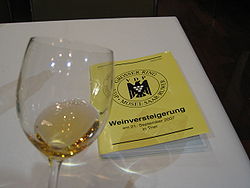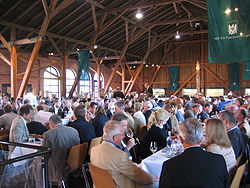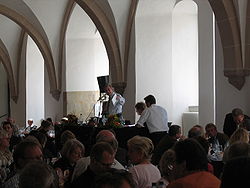
German wine auctions
Encyclopedia


Germany
Germany , officially the Federal Republic of Germany , is a federal parliamentary republic in Europe. The country consists of 16 states while the capital and largest city is Berlin. Germany covers an area of 357,021 km2 and has a largely temperate seasonal climate...
wine
Wine
Wine is an alcoholic beverage, made of fermented fruit juice, usually from grapes. The natural chemical balance of grapes lets them ferment without the addition of sugars, acids, enzymes, or other nutrients. Grape wine is produced by fermenting crushed grapes using various types of yeast. Yeast...
producers auction off some of the best young wines, as well as some older wines. Most auctions are arranged by the regional associations of Verband Deutscher Prädikats- und Qualitätsweingüter
Verband Deutscher Prädikats- und Qualitätsweingüter
Verband Deutscher Prädikats- und Qualitätsweingüter e.V. or the Association of German Prädikat Wine Estates, is an organisation where most of Germany's top wine producers are members. It is commonly known under its acronym VDP...
(VDP). These auctions differ from wine auction
Auction
An auction is a process of buying and selling goods or services by offering them up for bid, taking bids, and then selling the item to the highest bidder...
s on the second-hand market held by auction houses, where collectible wines are sold by private or corporate owners, since it is "first hand" wines that are sold.
Focus of the auctions
Originally and up until mid-20th century, before estate bottling was as standard as it is today, wines of more ordinary quality auctioned off by the barrel would also appear at these auctions. Today, the auctions are intended for small lot wines not sold through regular channels. Some of these wines are produced in quantities less than 100 liters. In the 2007 auctions, the smallest lot of a young wine corresponded to just 6 bottles (3 full and 6 half bottles) of a 2006 TrockenbeerenausleseTrockenbeerenauslese
Trockenbeerenauslese is a German language wine term for an intensely sweet dessert wine-style wine....
, and the largest lot corresponded to 648 bottles of a 2006 Spätlese
Spätlese
Spätlese is a German wine term for a wine from fully ripe grapes, the lightest of the late harvest wines. Spätlese is a riper category than Kabinett in the Prädikatswein category of the German wine classification and is the lowest level of Prädikatswein in Austria, where Kabinett is classified in...
. The auctions are to a large extent focused on semi-sweet and sweet Riesling
Riesling
Riesling is a white grape variety which originated in the Rhine region of Germany. Riesling is an aromatic grape variety displaying flowery, almost perfumed, aromas as well as high acidity. It is used to make dry, semi-sweet, sweet and sparkling white wines. Riesling wines are usually varietally...
wines, but some dry Riesling wines, Spätburgunder wines and a few other wines are also auctioned, depending on the region.
The system German wine classification
German wine classification
German wine classification consists of several quality categories and is often the source of some confusion, especially among non-German speaking wine consumers. The official classification is set down in the wine law of 1971, although some changes and amendments have been made since then...
system lends itself to differentiation of wines, especially sweet wines, according to quality level. This has most likely contributed to the tradition of producing small lot wines resulting from extreme selection, which is a tradition hardly found anywhere else in the wine world. The wines put up for auction belong in most Prädikat levels, but are usually given the additional designation Goldkapsel (Golden capsule) to show that they are "extra good", and small sticker announces that the bottle was sold at a particular auction. (To complicate matters, the unregulated Goldkapsel designation is not limited to auction wines.)
While the revenue from the auctions are far from insignificant for many of the sellers, the auctions also serve a marketing purpose for the best VDP members, since it is a rather small circle of estates that are good enough to sell wine in these auctions.
Auction procedure


Participation in the auction is open to any interested parties, but an entrance ticket must be paid. Formally, the sellers do not sell their wines to the individual participants of the auction, but rather to approved commissioners, which act as intermediaries and cast the actual bids at the auction. These number about 10 per auction. The commissioners collect bids from a number of prospective buyers before and during the auction. In most cases, a wine lot will be divided among several commissioners, with one of them as lead buyer. Commissioners charge around five percent of the auction price for their services.
List of auctions
There are five auctions that are held annually:- March
- Hessische Staatsweingüter, the Hessian State Wineries (a governmen-owned VDP member), auction wines from their Rheingau and Hessische Bergstrasse operations at Kloster Eberbach in Rheingau.
- September, on four consecutive days
- Thursday: Bernkasteler Ring in Mosel holds an auction, usually at Kloster Machern in Bernkastel-Wehlen.
- Friday: VDP Grosser Ring in Mosel holds an auction, usually in the congress centre Europahalle in TrierTrierTrier, historically called in English Treves is a city in Germany on the banks of the Moselle. It is the oldest city in Germany, founded in or before 16 BC....
. - Saturday: VDP Rheingau holds an auction at Kloster Eberbach.
- Sunday: VDP Nahe-Ahr holds an auction, usually at Römerhalle ("Roman Hall") in Bad KreuznachBad KreuznachBad Kreuznach is the capital of the district of Bad Kreuznach, Rhineland-Palatinate, Germany. It is located on the Nahe river, a tributary of the Rhine...
. From 2007 some VDP wineries from Rheinhessen and Pfalz also participate, which means that wine from four regions are auctioned.
Highest prices
The highest prices for young wines fetched in the autumn 2007 auctions, as full bottle prices excluding tax and commission, were:- Bernkasteler Ring: Weingut Markus Molitor, Wehlener Sonnenuhr Beerenauslese*** 2004, 850 euroEuroThe euro is the official currency of the eurozone: 17 of the 27 member states of the European Union. It is also the currency used by the Institutions of the European Union. The eurozone consists of Austria, Belgium, Cyprus, Estonia, Finland, France, Germany, Greece, Ireland, Italy, Luxembourg,...
- VDP Mosel: Weingut Egon Müller-Scharzhof, Scharzhofberger Eiswein 2004, 1150 euro
- VDP Rheingau: Weingut Robert Weil, Kiedrich Gräfenberg Beerenauslese Goldkapsel 2006, 840 euro
- VDP Nahe: Weingut H. DönnhoffDönnhoffWeingut Hermann Dönnhoff is a German wine grower and producer based in Oberhausen, in the wine-growing region of Nahe, Germany. The Dönnhoff family have been making wine in this region since 1750....
, Oberhäuser Brücke Riesling Trockenbeerenauslese Goldkapsel 2005, 1450 euro - VDP Ahr: Weingut Meyer-Näkel, Walporzheimer Kräuterberg Spätburgunder Grosses Gewächs 2005, 100 euro
The most expensive old wine was a single bottle of Erbacher Markobrunn Riesling Trockenbeerenauslese Cabinet 1937 sold by Schloss Reinhartshausen at 2650 euro.

